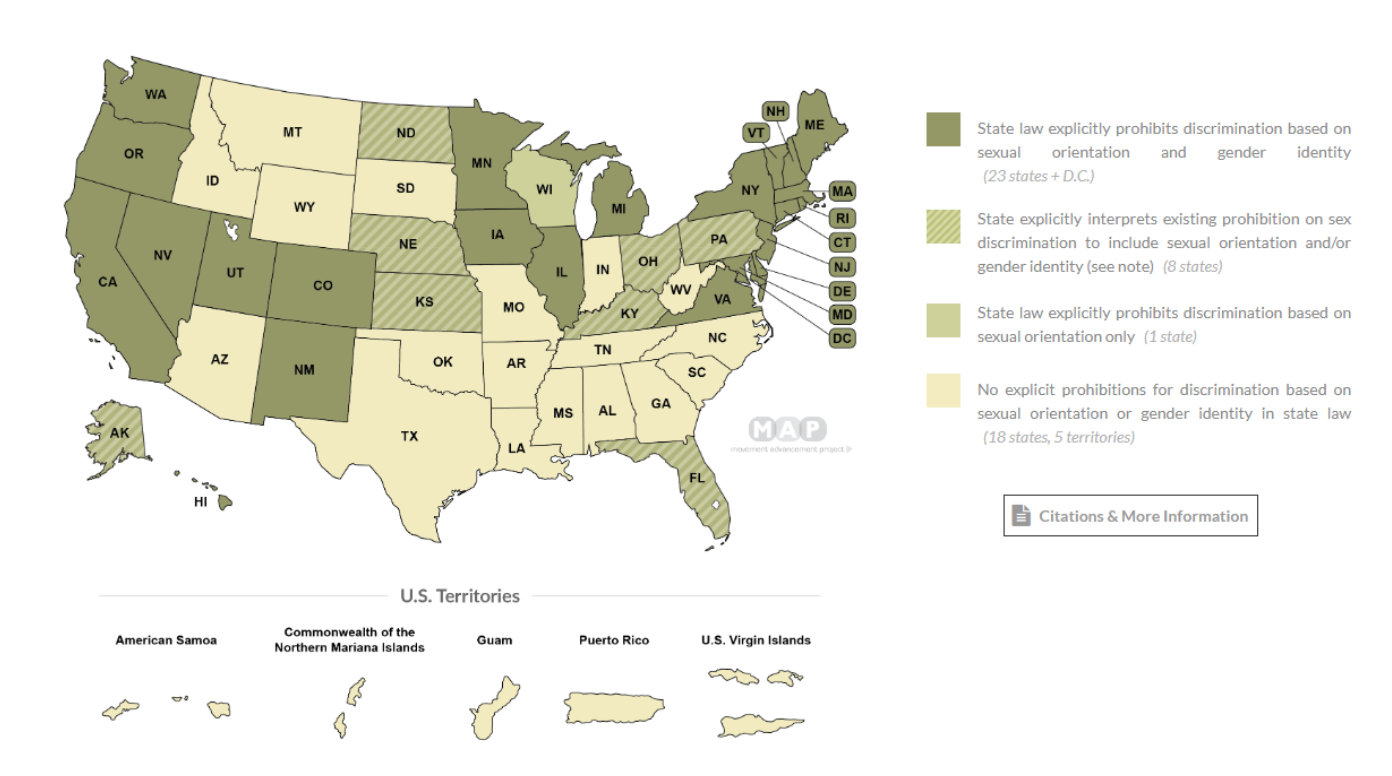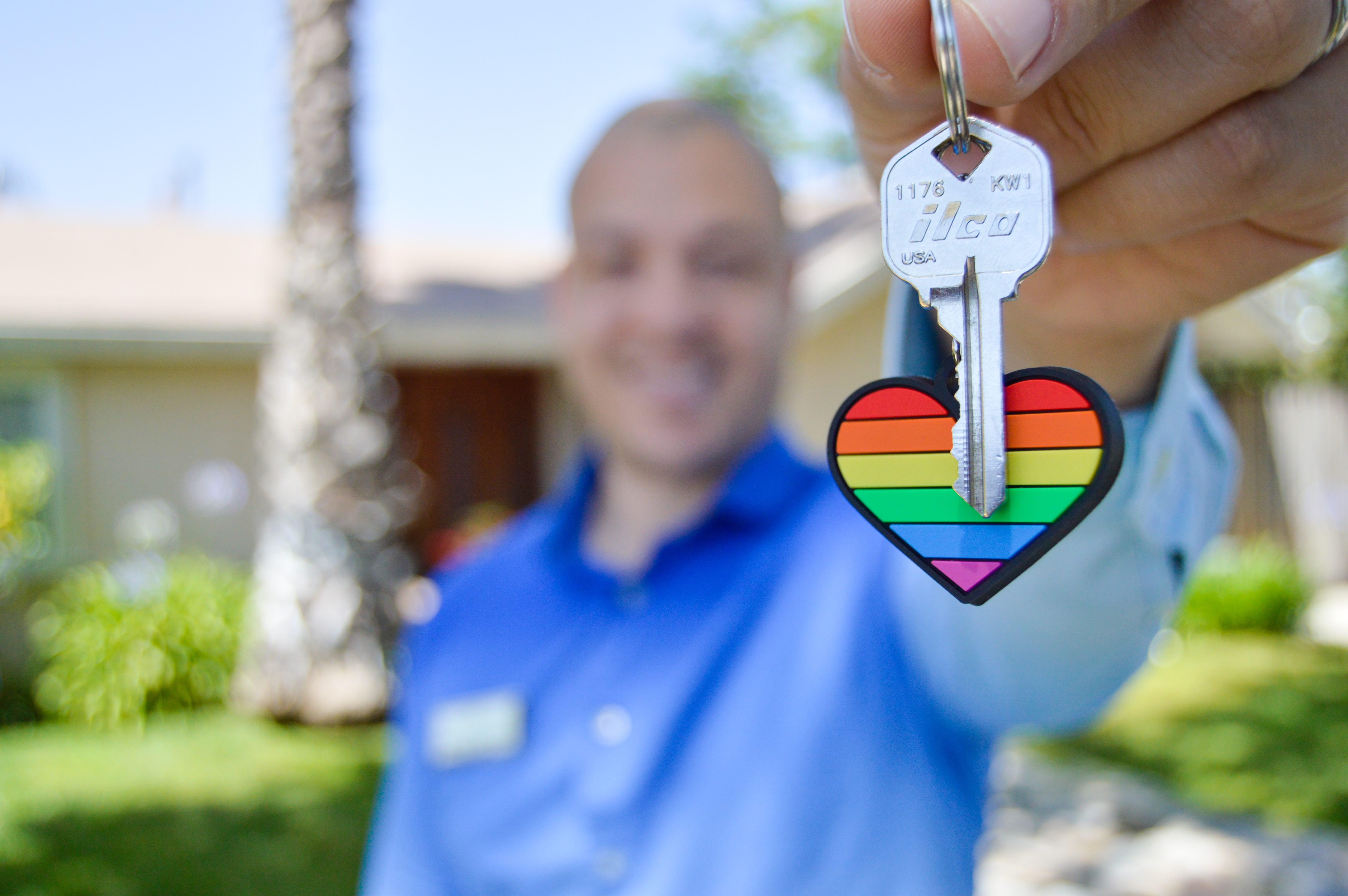In states with no gender identity and sexual orientation discrimination laws, fighting housing discrimination is a challenge.
Despite improvements in federal and state laws, housing discrimination against LGBTQ individuals continues to exist in America.
At the time of writing, 23 states and the District of Columbia (D.C.) have laws that ban discrimination based on sexual orientation and gender identity. Eight states have laws that interpret existing prohibitions on sex discrimination to include sexual orientation and gender identity.
One state prohibits discrimination based on sexual orientation only, and 18 states plus five territories have no laws that prohibit discrimination based on sexual orientation or gender identity.

The Prevalence of Housing Discrimination Against LGBTQ Tenants
Several studies show that LGBTQ tenants are often treated unfairly by landlords or rental agencies, or restricted from accessing rental accommodation. Examples of housing discrimination against LGBTQ people in the rental market include:
- Same-sex couples receiving fewer email or telephonic responses to inquiries on advertising rental units.
- Rental agents informing gay or transgender applicants of fewer rental properties available than they do heterosexual or cisgender applicants. They may limit viewings to neighborhoods with a strong LGBTQ presence.
- Landlords or rental agents scheduling fewer appointments with transgender persons and same-sex families.
- Housing providers charging same-sex married couples a higher application fee than married heterosexual couples.
- Landlords raising the rental price for LGBTQ tenants.
Minority groups are at a higher risk for discrimination. A study by the Equal Rights Center found that 48% of older same-sex couples experienced adverse differential treatment when trying to access senior housing.
As a result of these discriminatory practices LGBTQ people, especially young people, people of color and those with disabilities, face higher rates of homelessness. Many are forced to seek public housing assistance to avoid being on the streets.
How the Fair Housing Act protects LGBTQ people against housing discrimination
The Fair Housing Act protects everyone renting or buying a home, getting a mortgage and seeking housing assistance. The Act prohibits housing discrimination based on race, color, national origin, religion, sex, familial status, and disability. The original Act did not explicitly include discrimination based on gender identity and sexual orientation.
That changed on January 20, 2021, when President Biden signed an Executive Order aimed at combating and preventing discrimination on the basis of gender identity and sexual orientation. Subsequently, the Fair Housing Act was amended and the definition of “sex” expanded to include gender identity and sexual orientation.
What legal recourse do LGBTQ tenants who are experiencing housing discrimination have?
Housing discrimination isn’t always obvious. Let’s say you’re told that a rental is no longer available after a housing provider realizes you are a same-sex parented family, or you’re evicted for no valid reason after your landlord finds out you are gay. These are subtle ways LGBTQ people are discriminated against and can be hard to prove.
More blatant forms of discrimination can include verbal or physical abuse, harassment and acts of vandalism by neighbors or community members on your property. If you have children, they may be mocked or victimized by other kids in the neighborhood.
What recourse do you have if you suspect you or your family are being discriminated against?
- You can file a complaint with the Office of Fair Housing and Equal Opportunity (FHEO), an agency within the U.S. Department of Housing and Urban Development.
- You can report any incidents of harassment or discrimination to the American Civil Liberties Union (ACLU).
- If you live in a state with laws that prohibit discrimination based on gender identity or sexual orientation, lodge a complaint with your local authority. Alternatively, contact a lawyer who specializes in LGBTQ rights in your state.
- If you suspect you have been denied a rental application, there may be little or no recourse unless you have clear evidence to the effect.
- If your landlord has ended your lease early or you have been wrongly evicted, you can take legal action against them if you can prove you have not breached the terms of your contract.
- If your property has suffered damage or acts of vandalism, e.g., graffiti with homophobic messages, there may be little or no recourse if you can’t prove who is responsible. To add insult to injury, your landlord may hold you liable for the damage. It’s advisable to take out renters insurance, which typically covers malicious damage to a rental property and damage or theft of your personal belongings.
- If you or any member of your family has received threats or been the victim of homophobic aggression or violence from people in the community, report it to your local police.
In states with no gender identity and sexual orientation discrimination laws, fighting housing discrimination is a challenge. As federal and state laws in favor of LGBTQ tenant rights tighten and more lawyers are willing to represent LGBTQ clients, we should start to see a decline in discriminatory housing practices.
Sources:
LGBTQ Equity and Housing Fact Sheet – Opportunity Starts at Home
Movement Advancement Project | Nondiscrimination Laws
Discrimination is limiting LGBTQ people’s access to rental housing | Urban Institute
Stamping Out LGBT Discrimination in Housing
Know Your Rights | LGBTQ Rights | American Civil Liberties Union


Join the conversation!